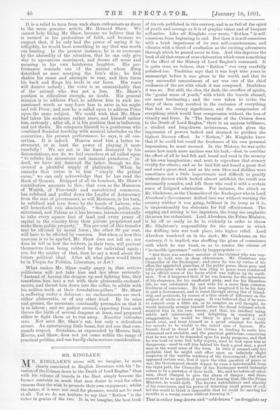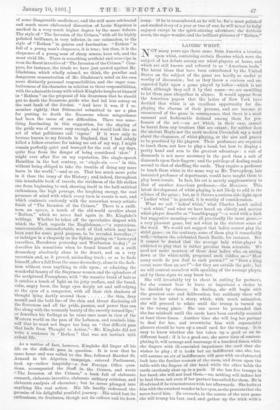MR. KINGLAKE.
NIR. KINGLAKE'S name will, we imagine, he more closely associated in English literature with his "In- vasion of the Crimea down to the Death of Lord Raglan" than with his volume of travels in the East, simply because the former contains so much that men desire to read for other reasons than the wish to promote their own enjoyment; whilst the latter, if it were not read for pleasixre, would not be read at all. Yet we do not hesitate to say that " Eothen" is the richer in genius of the two. It is we imagine, the best book of tra vels published in this century, and is as full of the spirit of youth and courage as it is of graphic vision and of buoyant self-satire. Like all Kinglake ever wrote, " Eothen " is self- conscious from beginning to end. But then it is self-conscious with a brisk impatience of its own self-consciousness, and vibrates with a throb of exultation as the exciting adventures through which he passed recur to him. And this deprives the book of all that sense of over-elaboration which mars something of the effect of the History of Lord Raglan's command. It is quite true, we believe, that " Eothen " was very carefully polished too. Tradition says that it was kept nine years in manuscript before it was given to the world, and that its very successful concealment of art was one of the chief evidences of the art with which it was composed. Doubtless it was so. But still, the elan, the dash, the overflow of spirits, the "genial sense of youth," with which the travels abound, are most fascinating ; and the care taken to revise the story of them only resulted in the exclusion of everything that had no literary significance, and the compression of everything which would bear compression without the loss of vivacity and force. In "The Invasion of the Crimea down to the Death of Lord Raglan," there is an anxious brilliance, a studied and long-drawn incisiveness, which gives the impression of powers tasked and strained to produce the highest literary effect. In " Eathen," Mr. Kinglake knew that if he could but recall the freshness of his own personal impressions, he must succeed. In the History, he was quite aware how much more anxious was his task,—first, to combine the effect of all he had felt and heard and read in the scenery of his own imagination; and, next, to reproduce that scenery vividly for others ; and as he had felt and heard a great deal and read a great deal, and as his own likes and dislikes were sometimes not a little importunate and difficult to gratify without devices which looked almost artificial, the result was necessarily complex, and left those who read it with a certain sense of fatigued admiration. For instance, the attack on Mr. Gladstone, as the Chancellor of the Exchequer who in Lord Aberdeen's Government drifted into war without warning the country whither it was going, brilliant in its irony as it is, is unquestionably too elaborate for full effectiveness. The sapping and mining is too ingenious, the irony too emphatic, the scorn too redundant. Lord Aberdeen, the Prime Minister, is let off so easily as he is, evidently in order to throw Mr. Gladstone's responsibility for the manner in which the drifting into war took place, into higher relief. Lord Aberdeen wandered on in the dark ; Mr. Gladstone, on the contrary, it is implied, was shu ing the pleas of conscience with which he was beset, so as to render the excuse of "invincible ignorance" entirely inappropriate :- " But there was another member of the Cabinet who was sup- posed to hold war in deep abhorrence. Mr. Gladstone was Chancellor of the Exchequer ; and since he was by virtue of his office the appointed guardian of the public purse, those pure and lofty principles which made him cling to peace were reinforced by an official sense of the harm which war inflicts by its costli- ness. Now it happened that, if ho was famous for the splendour of his eloquence, for his unaffected piety, and for his blameless life, he was celebrated far and wide for a more than common liveliness of conscience. He had once imagined it to be his duty to quit a Government, and to burst through strong ties of friend- ship and gratitude, by reason of a thin shade of difference on the subject of white or brown sugar. It was believed that if he were to commit even a little sin, or to imagine an evil thought, he would instantly arraign himself before the dread tribunal which awaited him in his own bosom; and that, his intellect being subtle and microscopic, and delighting in casuistry and exaggeration, he would be likely to give his soul a very harsh trial, and treat himself as a great criminal for faults too minute to be visible to the naked eyes of laymen. His friends lived in dread of his virtues as tending to make him whimsical and unstable, and the practical politicians, conceiving that he was not to be depended upon for party purposes, and that he was bent on none but lofty objects, used to look upon him as dangerous,—used to call him behind his back a good man, a good man in the worst sense of the term. In 1853 it seemed only too probable that he might quit office upon an infinitely slight suspicion of the warlike tendency of the Government : but what appeared certain was, that if upon the vital question of peace or war, the Government should depart by oven a hairsbreadth from the right path, the Chancellor of the Exchequer would instantly' refuse to be a partaker of their fault. Ho, and he before all other men, stood charged to give the alarm of danger ; and there seemed to be no particle of ground for fearing that, like the Prime Minister, he would drift. The known watchfulness and alacrity of his conscience, and his power of detecting small germs of evil, led the world to think it impossible that he could be moving for
i
months in a wrong course without knowing it."
That is rather long-drawn and " cold-drawn " (as druggists say of some disagreeable medicines), and the still more celebrated and much more elaborated dissection of Louis Napoleon is marked in a very muoh higher degree by the same defects. The style of " The Invasion of the Crimea," with all its highly polished brilliance, is very inferior, in our estimation, to the style of "Eothen " in genius and fascination. "Eothen " is full of a young man's eloquence, it is true; but then, it is the eloquence of a young man of sharp senses, keen wit, and the most vivid life. There is something artificial and over-ripe in even the finest invective of "The Invasion of the Crimea." Com- pare, for instance, the tirade we have just quoted against Mr. Gladstone, which wholly missed, we think, the peculiar and dangerous concentration of Mr. Gladstone's mind on his own more distinctly personal responsibilities, and the eager com- bativeness of his character in relation to those responsibilities, with the admirable irony with which Kinglake laughs at himself in "Eothen" on the proposal of his dragoman that he should put to death the Nazarene guide who had led him astray on the east bank of the Jordan. " And here it was, if I re- member rightly, that Dthemetri submitted to me a plan for putting to death the Nazarene whose misguidance had been the cause of our difficulties. There was some- thing fascinating in this suggestion, for the slaying of the guide was of course easy enough, and would look like an act of what politicians call 'vigour? If it were only to become known to my friends in England, that I had calmly killed a fellow-creature for taking me out of my way, I might remain perfectly quiet and tranquil for the rest of my days, quite free from the danger of being considered slow.' I might ever after live on my reputation, like single-speech Hamilton in the last century, or ' single-sin ' in this, without being obliged to take the trouble of doing any more harm in the world,"—and so on. That has muoh more pulse in it than the irony of the History ; and indeed, throughout this inimitable book of travels, the vividness of the life strikes one from beginning to end, showing itself in the half-satirical enthusiasm, the high pourage, the laughing energy, the cool presence of mind with which every turn in events is met, and which contrasts curiously with the somewhat weary artistic finish of "The Invasion of the Crimea." There is a swift- ness, an °perm, a touch of the old-world cavalier about " Eothen," which we never find again in Mr. Kinglake's writings. Whether he takes off the speculative disgust with which the Turk regards the Englishman,—" a mysterious, unaccountable, uncomfortable work of God which may have been sent for some good purpose, to be revealed hereafter ;" or indulges in a rhapsody on the Sphinx gazing on " keen-eyed travellers, Herodotus yesterday and Warburton to-day;" or describes his sensations when he found himself on a swift dromedary absolutely alone in the desert, and on a very uncertain and, as it proved, misleading track ; or as he finds himself, after a fall from the same dromedary, alone in the dark- ness without even anything to ride upon ; or admiring the wonderful beauty of the Smyrnese women and the splendour of the sculptured Persephone, with " the massive braid of hair as it catches a touch of light on its jetty surface, and the broad, calm, angry brow, the large eyes deeply set and self-relying as the eyes of a conqueror, with all their rich shadows of thought lying darkly around them the thin, fiery nostril and the bold line of the chin and throat disclosing all the fierceness and all the pride, passion, and power that can live along with the womanly beauty of the sweetly-turned lips;" or describes his feelings as he came once more in view of the Western world on the pass of the Lebanon, and reminds him- self that he must not linger too long on " that difficult pass that leads from Thought to Action,"—Mr. Kinglake did not write a sentence in " Eothen " that was not instinct with ardent life.
As a matter of fact, however, Kinglake did linger all his life on the difficult pass in question. It is true that he came home and was called to the Bar, followed Marshal St. Arnaud in his Algerian campaign, entered Parliament, took up—rather languidly—a few Foreign Office ques- tions, accompanied the Staff in the Crimea, and wrote "The Invasion of the Crimea," a book full of elaborate research, elaborate invective, elaborate military criticism, and elaborate analysis of character ; but he never plunged into anything like real action. His life hardly redeemed the promise of his delightful youthful journey. His mind lost its enthusiasm, its freshness, though not its culture and its keen irony. If he is remembered, as he will be, for a most polished and studied story of a year or two of war, he will never be fully enjoyed except in the spirit-stirring adventure, the dubious scorn, the eager wonder, and the brilliant pictures of "Eothen."

































 Previous page
Previous page